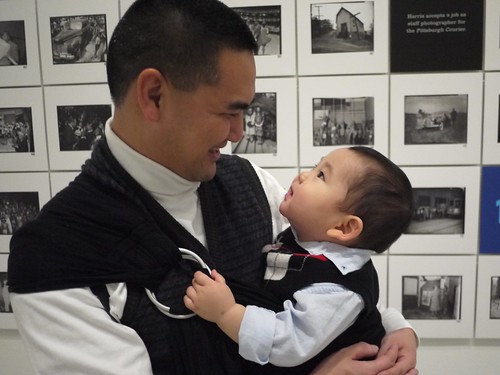Some lighthearted observations. Then a serious one.
1. T is learning how to go down things. We've been trying to get him to get off of a mattress backwards (feet first). Not only has he started to do this consistently (instead of charging headfirst off them), he also figured out that this is how to go down stairs. The books state that this marks the end of the 'stairs are dangerous' period, and some of the more natural parenting types consider this as the goal instead of using baby gates. Mind you, we are keeping the baby gates, but we don't have them everywhere. And maybe we won't need to.
2. Loves bananas. He amuses everyone at grocery stores when we go pick up bananas and he is so happy to have them. Even better when he cries out 'nana, nana' for all to hear once we get within sight of the bananas.
3. He likes to feed mommy and daddy. Taking a spoon of yogurt and putting in our mouths. Cheese, crackers, bread, even a banana. We like to think that this is his way of showing love (after all, feeding him is what we do)
4. He is generally a very happy child. Except when it comes to sleeping. Then he is a very unhappy child. *sigh* *yawn*
5. He has continued to like it when we read to him. Our babysitter comments that she is surprised that he has the patience to make it through books. Of course, he has been doing this for months.
6. At day care they had evaluations. One funny one was 'does not show affection to stuffed animals.' He actually does not have stuffed animals at home, so the idea of forming attachments to things, not people, is probably not something that has occurred to him.
7. A more serious note, the evaluators also mention that he is slow on all marks regarding socialization and language. Of course, most of the behaviors they mark as deficient, he does show at home. The problem, of course, is that we are raising T bilingual. And our understanding is that children raised bilingual will be evaluated as slow until they are around 5-6. I have colleagues who are in the same situation.
We have promised ourselves that we would ignore things like milestones for the first few years. But this is where it is important to check that we do believe in this. Because we believe that the goal of raising children is not for good grades or evaluations, but to prepare them for the world. And while evaluations are important, if they do not further that goal, they are to be ignored. Learning to put aside these evaluations now, after considering what they mean, hopefully makes us better able to work with evaluations in the future. And take us further in our goal of raising a child.
Sunday, January 01, 2012
Parenting Month 14: Evaluations and goals
Labels:
parenting
Subscribe to:
Post Comments (Atom)

No comments:
Post a Comment